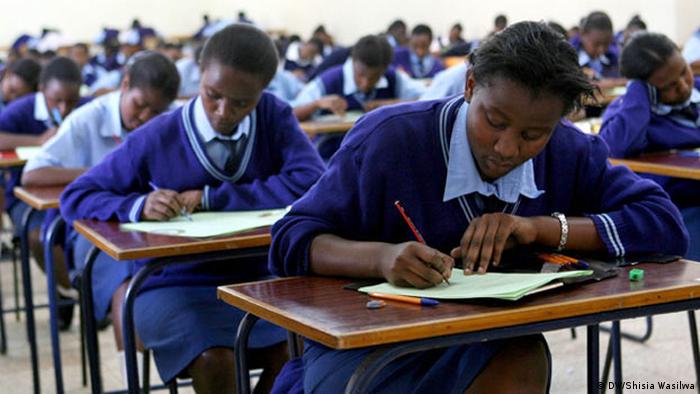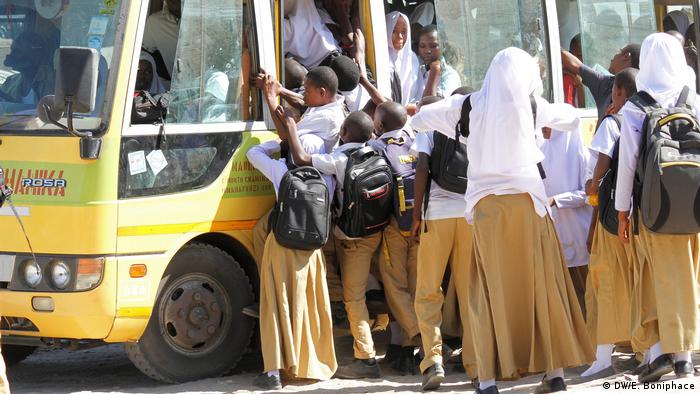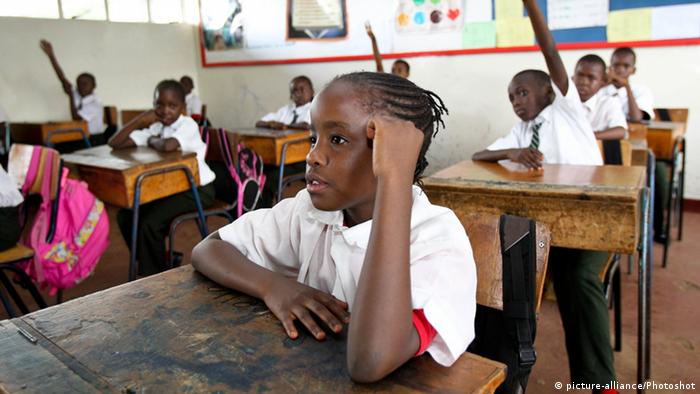Many African children do not understand their teachers. Because the often speak European languages: English, French, Portuguese. The search for Alternatives is running in many countries – and it is complicated.

Up to 2000 different languages there are in the African countries South of the Sahara. However, in the classroom, this diversity is not reected. The classes are held often in languages that go back to colonial rule, although some of the children at the school entry, not a single word of it, understand.
Counterproductive, experts say: “If you are looking for a measure to get children to stop from Learning, then you have found this already: By teaching in a language you will not hear in their environment,” says the Norwegian education researcher, Birgit Brock-Unte. She currently holds a visiting professorship at the University of the Witwatersrand in South Africa. “The research shows very clearly that you should start with the mother tongue or another familiar language.”
A very different atmosphere in the class room
This happens now in some countries in Africa. Primary schools include local languages in the classroom: the promotion of reading about language courses up to the exclusive teaching in the local language. Especially in the primary school age, the mother tongue is of fundamental importance; the evidence of scientific studies, such as the “Global Education Monitoring Report, 2016” the organization of the United Nations educational, scientific and cultural organization (UNESCO). At least six years, the children should learn, therefore, in their native language, otherwise you will only learn slowly or there are gaps. In the native language of the children to be active and critical, the atmosphere in the classroom was very different, also tells Brock-Unte. So she stays, it at research in Tanzania and South Africa experienced.

Not all of the students in Africa understand their teachers
The Deutsche Welle has investigated how different countries are dealing with the language question. In Nigeria, there are about 500 languages – but the classes are held mostly in English. A pilot project is trying now, the most widely used local languages to promote Hausa, Yoruba and Igbo in the classroom: In the first years should be taught in these languages. Similarly, in Senegal, the state and the language of instruction is French, roughly a third of the Senegalese master. There are projects for bilingual education In French and another language. In Mozambique official language Portuguese – 23 of the local languages in this way as languages of instruction in the primary schools move in. Ethiopia was occupied in contrast to these countries, never colonial, but nevertheless, with the introduction of local languages in the classroom. Because the use of only a local language says a great resistance of the other language groups encounter, Axel flesh, a Professor of African studies at the University of Frankfurt. “There can be, of course, that the English as an international language that belongs, in a sense, anyone really, then more of the neutral Medium.”
Watch the Video 05:02 live Now 05:02 Min. 
Senegal: Hardly any opportunities to get an education
Send Facebook Twitter google+ Tumblr VZ Mr. Wong Xing Newsvine Digg
Permalink https://p.dw.com/p/2svWu
Senegal: Hardly any opportunities to get an education
High Cost
“Of course it would be better if the children learn in a language that you already know. The only question is: Which language do you know?” Rose Marie Beck, African studies Professor at the University of Leipzig asks. Most of the children grew up by themselves in several languages, and in only a few countries in Africa the people could rely on a widely used language, she says. Therefore, the teacher should use multiple languages, flexible to the children. All of this costs money. Organizations such as USAID, or the International organization of La Francophonie to provide assistance in the development of suitable teaching material and teacher training. But the road to area-wide supply is still far.
Reluctance of parents and elites
And Not always the use of the local launches languages in the lesson on encouragement. Members of the upper middle class or the elite put on European languages, says meat. And you were also involved in political decisions, for example, which language should be used in the schools. “And for the use of former colonial languages is not a Problem. You have the means to send their children to private schools. And your children are likely to take place in education in these languages is far enough.” So the elite could cement their advantages, because for higher-skilled occupations, European languages are still important. According to Brock-Utne, only a minority work, however, in these areas later on. It is therefore, to learn more international languages in the framework of a school subject, not as the language of instruction.

Many parents want their children to learn European languages
A further difficulty was that “Many parents believe, even if they spoke the Colonial itself does not speak, that children learn a foreign language best when it is used as the language of instruction,” says Brock-Utne. But the voice of the teacher: speak these languages are often not fluent in, and bring the children of error.
The Solution: African Multilingualism
In Africa’s predominant languages of instruction English, Portuguese and French in most cases have their roots in the colonial occupation of the African continent. But African languages would be viewed in their written Form, often as a colonial heritage, says Afrikanist meat. In South Africa, students took to the streets, to be able to study English and not in local languages, which would have supported the apartheid regime, he says.
Many of the written languages were actually dialects of the same language, explains Brock-Utne. Missionaries, they would have written different in different places, as you have translated the Bible. Therefore, you have to agree in many cases on one of several forms of writing, before teaching materials can be developed.
The Kenyan writer and linguist Ngugi wa Thiong’o has its own idea of which languages should be learned in school: “First of all, the mother tongue, then another African language, which helps to comes to communicate with people from other areas of Africa language. Only English, French, and other languages to come,” he said in an Interview with DW. In Africa, only English and French will be spoken, convey the impression that Knowledge would be – such as languages – from the outside.
Staff: Mohammed Khelef